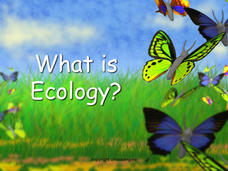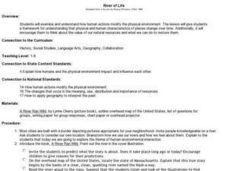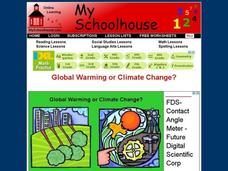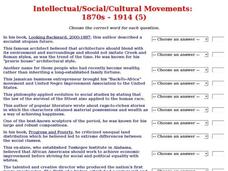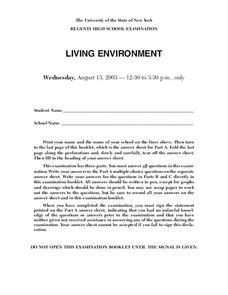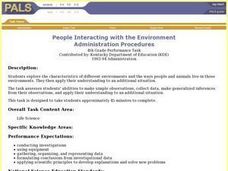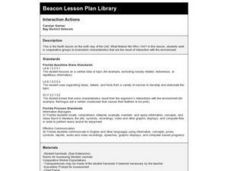Earth Day Network
Healthy Earth, Sick Earth
Earth is sick and needs our help! Read the children's book Planet Earth Gets Well to explain the various problems facing the planet, discussing what young conservationists can do to heal the planet along the way. A great Earth Day...
University of Kentucky
Beneficial Bug Scavenger Hunt
Many people think of bugs as annoying pests to be squashed, but most insects and spiders are beneficial, eating the actual pests or pollinating plants. After reviewing some of the common bugs in your area (they may differ from those...
National Wildlife Federation
The Amazing Adventures of Carbon: How Carbon Cycles through the Earth
Here's a stat for your pupils: 18 percent of the human body is carbon! Part 10 in the series of 12 takes pairs on an adventure through the carbon cycle. After a class reading about carbon, pairs read and choose their own adventure...
Curated OER
Ballet and Classical Music
Fourth graders explore ballet. In this dance and music humanities lesson, 4th graders practice ballet positions and play a card game using French ballet vocabulary. Students count beats in rhythm patterns and listen to classical music...
ARKive
Nocturnal Animals
How do those nocturnal animals see in the dark? This perplexing question does have an answer. First, little ones use their sense of touch to determine the name of a mystery object, then they listen closely to identify various animals by...
Biology Junction
What Is Ecology?
Do you know the name for the biological study of interactions? A short presentation with accompanying worksheet introduces individuals to ecology. The materials offer a broad overview of the subject and the levels of organization to...
American Museum of Natural History
What do You Know About Life on Earth?
Humans have only inhabited the earth for a fraction of the time that life has existed. Young scientists explore the facts about the emergence of life on Earth with an interactive resource. While highlighting different types of life, the...
Curated OER
Environment: River of Life
Students assess the impact of human activity on the environment. After reading the book, "A River Ran Wild," they role-play and discuss how people changed the river. Students write stories about living along a river from the point of...
Curated OER
Help! Someone Has Destroyed My Home!
Fifth graders use a mystery bag to discover ways in which humans endanger the life of animals by changing their habitat. In this animal habitat lesson, 5th graders work with a partner to design a solution to the problem of habitat...
Curated OER
World Geography: Smart Cities
Students are able to analyze how a variety of cities both in the USA and abroad have worked to improve human health and environment. They combine their prior knowledge of previous lessons and apply that knowledge to compare how each...
Curated OER
Gainging Perspective
Seventh graders examine and evaluate different perspectives of human and wolf interactions. They develop a conclusion based on research through the use of electronic resources.
Curated OER
Lesson Six
Students investigate the importance of ocean resources and what humans need to do to maintain a healthy ocean. For this oceans lesson students participate in an activity after viewing a PowerPoint presentation on the Earth's Waters.
Curated OER
5 Themes Awareness of Current Event Issues
Students analyze newspaper articles for the 5 themes of geography. They create a colorful portfolio explaining how each theme: location, place, etc. is relevant in a chosen current event.
My Schoolhouse
Global Warming or Climate Change?
In this online interactive global warming and climate change worksheet, students respond to 10 multiple choice questions regarding the information included in the provided paragraphs.
Curated OER
Global Warming or Climate Change?
In this online interactive global warming and climate change worksheet, learners respond to 10 multiple choice questions regarding the information included in the provided paragraphs.
Curated OER
Intellectual/Social/Cultural Movements: 1870s - 1914 (5)
In this online interactive American history worksheet, students answer 12 matching questions regarding late 1870's-1914 America. Students may submit their answers to be scored.
Curated OER
Living Environment
In this environmental lesson students complete a series of multiple choice and short answer questions on animal populations, cell structure and chromosomes.
Curated OER
D. A. M. Agriculture Lesson Plan
Students explore agricultural concepts and how humans modify the physical environment. They participate in card sorting activities to determine agricultural concepts: Dependence, Adaptation, Modification (D. A. M.). Students identify...
Curated OER
Surveying an Environment / Ecosystem
Young scholars visit a local ecosystem to survey the plants and animals present and identify interactions between organisms. They identify interactions that occur between living organisms and their ecosystem and present their ecosystem...
Curated OER
Choices Affect the Environment-I Make a Difference
Students examine and research how personal and societal choices can affect the environment. Student find resources that provide scientific research about the possible impact of each of the choices. Students then create a four-panel...
Curated OER
Our Environment
Students engage in a literature study that helps students to connect with some of the issues of conservation. They list parts of the environment that need protection with the help of a graphic organizer. Then students discuss in groups...
Curated OER
Ecology and Life Interactions
Students discuss the hierarchy of an ecosystem. They are asked what are the optimum conditions that support human life? Students are asked what are their personal "optimum conditions" are. They are given the following as the question...
Curated OER
People Interacting with the Environment
Students explore an arctic, temperate, and tropical environment and then decide what people need in each environment to help them live comfortably and what their lives would be like.
Curated OER
Interaction Actions
Fifth graders, in groups, write about things that happen as a result of interacting with their environment.







